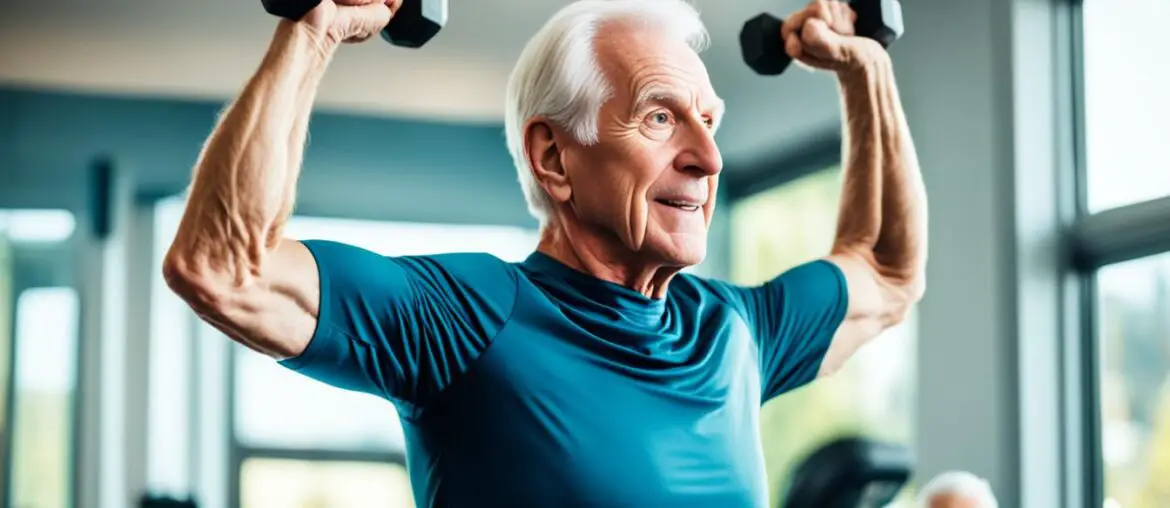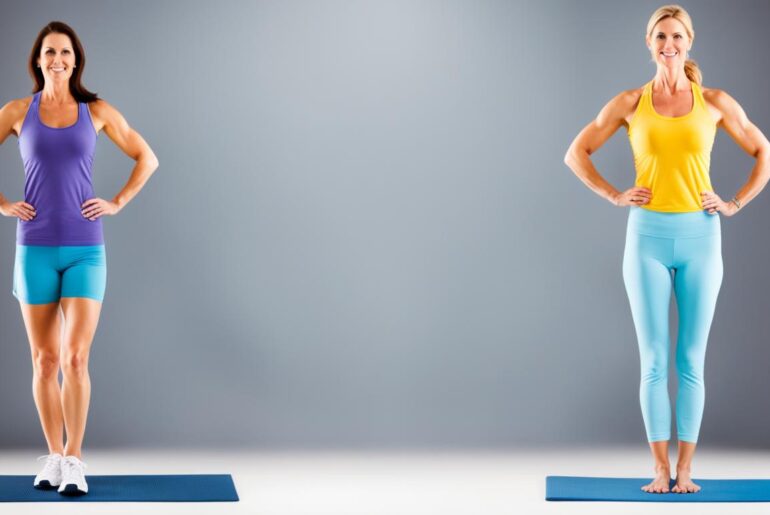As we age, maintaining a healthy weight and staying fit becomes increasingly important. Many seniors are intrigued by the concept of the HCG diet, which promises rapid weight loss. But how does this diet impact exercise for seniors? Is it safe and effective? And can seniors maintain their weight once the diet is over?
In this article, we will explore the role of the HCG diet and exercise for seniors. We will delve into the importance of exercise for seniors, how to incorporate exercise into the HCG diet, tips for exercising while on the diet, and maintaining weight after completing the diet. We will also discuss the safety and effectiveness of the HCG diet for seniors.
Key Takeaways:
- Seniors can benefit from incorporating the HCG diet and exercise into their lifestyle.
- Gentle exercise activities such as yoga, walking, or a gentle bike ride are recommended for seniors on the HCG diet.
- Gradually increasing calorie intake after the HCG diet is essential to avoid weight gain.
- Regular exercise plays a crucial role in the overall health and well-being of seniors.
- Seniors should consult with their healthcare provider before starting any weight-loss program.
The Importance of Exercise for Seniors
Regular exercise is essential for senior health and fitness. Engaging in physical activity can have numerous benefits for seniors, both physical and mental. It plays a crucial role in improving cardiovascular fitness, maintaining muscle strength and endurance, and enhancing balance and flexibility. Additionally, exercise can have a positive impact on mood and mental well-being, promoting a sense of happiness and overall wellness.
One of the key advantages of exercise for seniors is its contribution to weight management. Staying physically active helps manage body weight by burning calories, increasing metabolism, and building lean muscle mass. Senior fitness programs that combine cardiovascular exercises with strength training can effectively support weight loss and maintenance.
In addition to its impact on weight management, exercise is also crucial for reducing the risk of chronic diseases such as heart disease, diabetes, and osteoporosis. Regular physical activity can improve heart health, lower blood pressure, control blood sugar levels, and enhance bone density. By incorporating exercise into their daily routine, seniors can significantly improve their overall health and reduce the risk of these debilitating conditions.
“Exercise is the key to healthy aging. It helps maintain physical function and independence, promotes longevity, and enhances quality of life.”
Seniors should consider a variety of exercises that encompass cardiovascular fitness, strength training, flexibility exercises, and balance training. This holistic approach ensures an all-encompassing fitness routine that addresses multiple aspects of senior health and well-being. Activities such as walking, swimming, strength training, yoga, and tai chi are particularly beneficial for seniors.
It is important for seniors to consult with a healthcare professional before beginning any new exercise regimen, especially if they have any underlying health conditions or physical limitations. A personalized fitness program tailored to their specific needs can maximize the benefits of exercise while minimizing the risk of injury.
Remember, it’s never too late to start exercising. Even seniors who have been sedentary for a long time can experience significant improvements in their health and fitness by incorporating physical activity into their daily routine. Start small and gradually increase the duration and intensity of the workouts to build strength and endurance over time.
The Benefits of Exercise for Seniors:
- Improved cardiovascular fitness
- Maintained muscle strength and endurance
- Enhanced balance and flexibility
- Reduced risk of chronic diseases
- Weight management support
- Increased metabolism and calorie burning
- Enhanced mood and mental well-being
By prioritizing regular exercise and incorporating it into their daily routine, seniors can take proactive steps towards achieving optimal health and well-being.
Incorporating Exercise into the HCG Diet
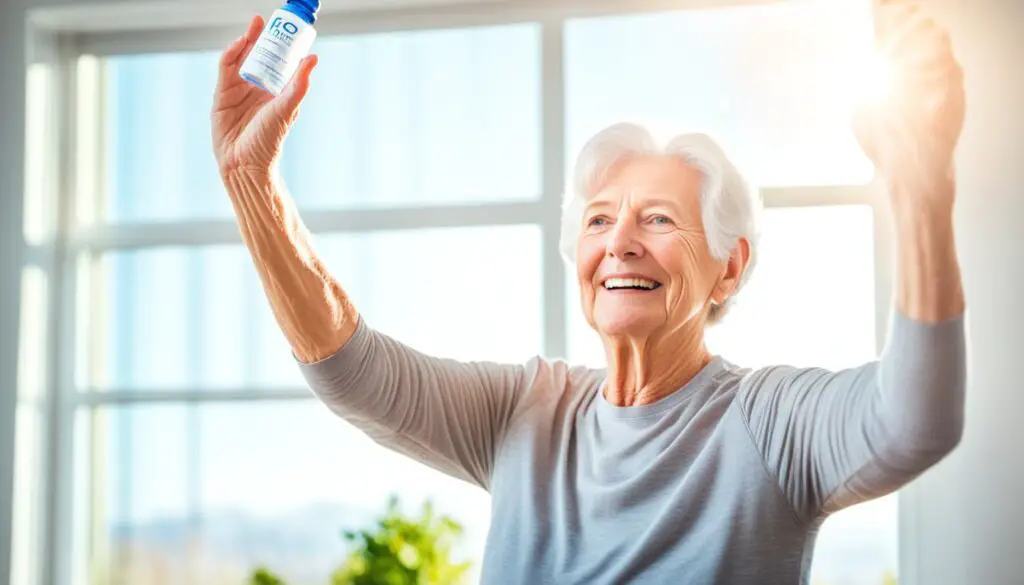
As seniors embark on the HCG diet journey, it is essential to continue engaging in regular exercise to support their weight management goals. However, exercise should be approached with caution and at a reduced intensity. Daily or almost daily gentle exercise, such as walking or light jogging, is highly recommended. Starting with a daily 15-minute walk can be a great way for seniors to gradually introduce exercise while on the HCG diet. Over time, the duration and intensity of the exercise can be increased as the body adjusts and becomes more accustomed to physical activity.
Easing into exercise is particularly important for seniors who have not been physically active in years. Jumping into a moderate exercise regimen during the HCG diet could lead to unnecessary strain or injury. It’s crucial to listen to your body and prioritize safety.
By incorporating exercise into the HCG diet, seniors can experience a variety of benefits. Exercise can help improve cardiovascular health, strengthen muscles, enhance flexibility, and boost overall well-being. Additionally, regular physical activity can support weight management efforts and contribute to a healthier lifestyle.
For those who prefer to engage in activities other than walking or light jogging, there are plenty of options available. Seniors can explore various low-impact exercises such as yoga, tai chi, or gentle cycling. These activities provide an opportunity to stay active while respecting the body’s needs and limitations.
Remember, it’s essential to consult with a healthcare provider before starting any diet or exercise program, including the HCG diet. They can provide personalized guidance and ensure that the HCG diet and exercise plan align with individual health needs and goals.
Tips for Exercising on the HCG Diet
When it comes to exercise on the HCG diet, senior individuals may need to tone down their intensity while still maintaining a regular rhythm of physical activity. Here are some tips to help seniors stay active and engaged while on the HCG diet:
1. Try Gentle Activities
Gentle activities such as yoga, walking, or a gentle bike ride can provide seniors with a way to stay active without putting too much strain on their bodies. These low-impact exercises can still contribute to overall fitness and help with senior weight management.
2. Take the Stairs
A simple change like taking the stairs instead of the elevator can make a big difference in daily activity levels. This small adjustment allows seniors to incorporate more movement into their day without the need for a formal exercise routine.
3. Explore Online Workouts
Seniors can take advantage of online or on-demand workouts tailored specifically for their fitness levels. These workouts can offer guidance and instruction while allowing seniors to exercise in the comfort of their own homes.
4. Modify Exercise for Injuries
If a senior experiences an injury during the HCG diet, it is essential to prioritize recovery. However, seniors can focus on working out other muscle groups that are not affected by the injury. This allows them to maintain their exercise routine while allowing the injured area to heal.
5. Maintain a Nutritious Diet
While exercise is crucial, it is equally important to maintain a nutritious diet throughout the HCG diet. Seniors should focus on consuming whole foods, including lean proteins, fruits, vegetables, and whole grains.
Incorporating these tips can help seniors strike a balance between exercise and diet while on the HCG diet. It is important to find enjoyable activities that keep seniors motivated and engaged in their fitness journey.
Maintaining Weight After the HCG Diet
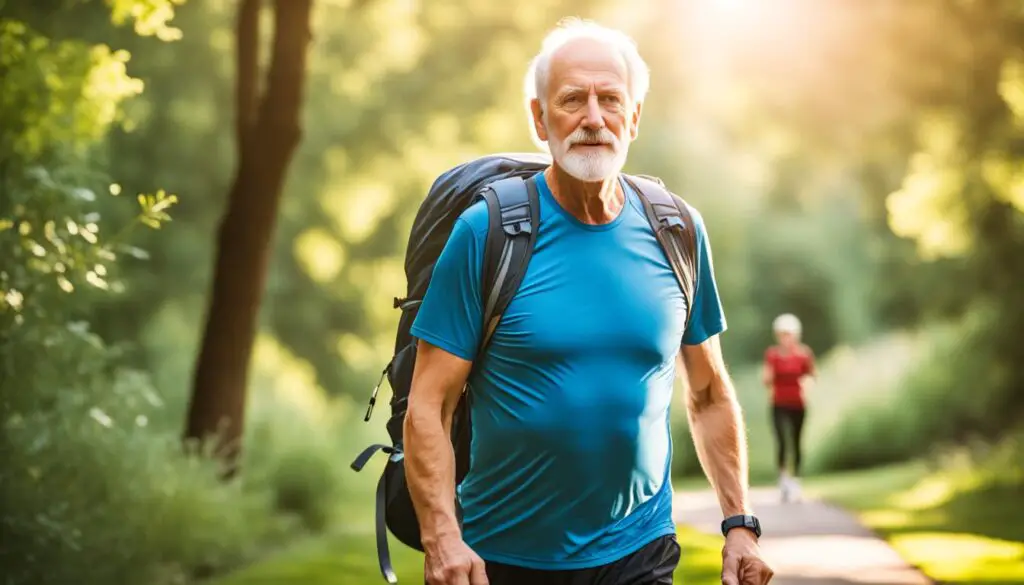
After completing the HCG diet, it is crucial for seniors to focus on maintaining their weight to avoid weight gain. Gradually increasing calorie intake while reintroducing their normal diet routine is key. Starting with low-carb and low-fat foods can help seniors ensure a healthy and balanced diet. It is recommended to increase calorie intake by 200 kcal per day until reaching the general optimum amount of 1500 kcal per day.
Regular exercise remains essential for seniors to maintain their weight after completing the HCG diet. To achieve optimal weight management, seniors should aim for at least 75 minutes of vigorous exercise or 150 minutes of moderate exercise per week. This can include activities such as brisk walking, swimming, cycling, or participating in fitness classes specifically designed for seniors.
By combining a balanced diet and regular exercise, seniors can maintain their weight, improve their overall health, and achieve long-term success in their weight management journey.
Sample Weekly Exercise Plan for Seniors
| Day | Exercise | Duration |
|---|---|---|
| Monday | Brisk Walking | 30 minutes |
| Tuesday | Strength Training (with light weights) | 20 minutes |
| Wednesday | Swimming | 30 minutes |
| Thursday | Yoga or Pilates | 40 minutes |
| Friday | Cycling | 45 minutes |
| Saturday | Low-Impact Aerobics | 30 minutes |
| Sunday | Rest day | – |
Remember, it is important for seniors to consult with their healthcare provider before starting or modifying any exercise or diet plan, especially if they have any underlying health conditions. A personalized approach, taking into account individual needs and abilities, can help seniors achieve the best results.
The Safety of the HCG Diet
The HCG diet is a subject of debate regarding its safety and effectiveness. The FDA strongly advises against the use of over-the-counter HCG weight-loss products that haven’t been approved, as they may pose risks to senior health and fitness. Severe calorie restriction, characteristic of the HCG diet, can lead to potential health risks including gallstone formation, irregular heartbeat, and nutrient deficiencies.
It is crucial for seniors to prioritize their well-being when considering a weight-loss program. Therefore, consulting with a healthcare provider before starting any diet regimen, including the HCG diet, is highly recommended. Medical professionals can provide personalized guidance and assessment to ensure the senior’s safety throughout the weight management journey.
| Health Risks of the HCG Diet | Recommendations |
|---|---|
| Gallstone Formation | The severe calorie restriction can increase the risk of gallstone formation in seniors. |
| Irregular Heartbeat | Severe calorie restriction can negatively affect heart health, potentially causing irregular heart rhythms. |
| Nutrient Deficiencies | The highly restrictive nature of the HCG diet may lead to deficiencies in essential nutrients, such as vitamins and minerals. |
The Effectiveness of the HCG Diet

The effectiveness of the HCG diet for long-term weight loss is still under debate. While some individuals may experience short-term weight loss during the HCG diet due to severe calorie restriction, the long-term sustainability and maintenance of weight loss remain uncertain. It is important for seniors to focus on making healthy changes to their diet and exercise habits that lead to permanent weight loss instead of relying solely on the HCG diet.
Weight management is a multifaceted process that requires a comprehensive approach, including a balanced diet, regular physical activity, and healthy lifestyle choices. The HCG diet, which involves a very low-calorie intake and the use of hormone supplements, may provide initial weight loss results. However, its long-term effectiveness and potential side effects are still being researched.
Seniors should prioritize sustainable and healthy weight loss methods such as adopting a nutritious and balanced diet tailored to their specific needs and incorporating regular exercise into their daily routine. By focusing on maintaining a caloric deficit, eating a variety of nutrient-rich foods, and engaging in consistent physical activity, seniors can achieve long-term weight loss and improve their overall health and fitness.
Expert Insight
Although the HCG diet may offer temporary weight loss benefits, its long-term effectiveness remains questionable. It is crucial for seniors to prioritize sustainable lifestyle changes, including a balanced diet and regular exercise, to achieve lasting weight management results.”
By prioritizing a holistic approach to weight loss and overall well-being, seniors can optimize their health, maintain a healthy weight, and enhance their quality of life.
| Advantages of Sustainable Weight Loss Methods | Disadvantages of Relying Solely on the HCG Diet |
|---|---|
|
|
It is essential for seniors to consult with their healthcare provider before making any drastic changes to their diet or exercise routine. They can discuss personalized weight loss strategies and develop a plan that suits their individual needs and health considerations.
In conclusion, while the HCG diet may provide initial weight loss results, its long-term effectiveness and safety for seniors remain uncertain. Seniors are encouraged to focus on sustainable and healthy weight loss methods that include a balanced diet, regular exercise, and lifestyle modifications. By taking a holistic approach to weight management, seniors can achieve long-lasting results and improve their overall health and fitness.
Personalized Senior Fitness Programs
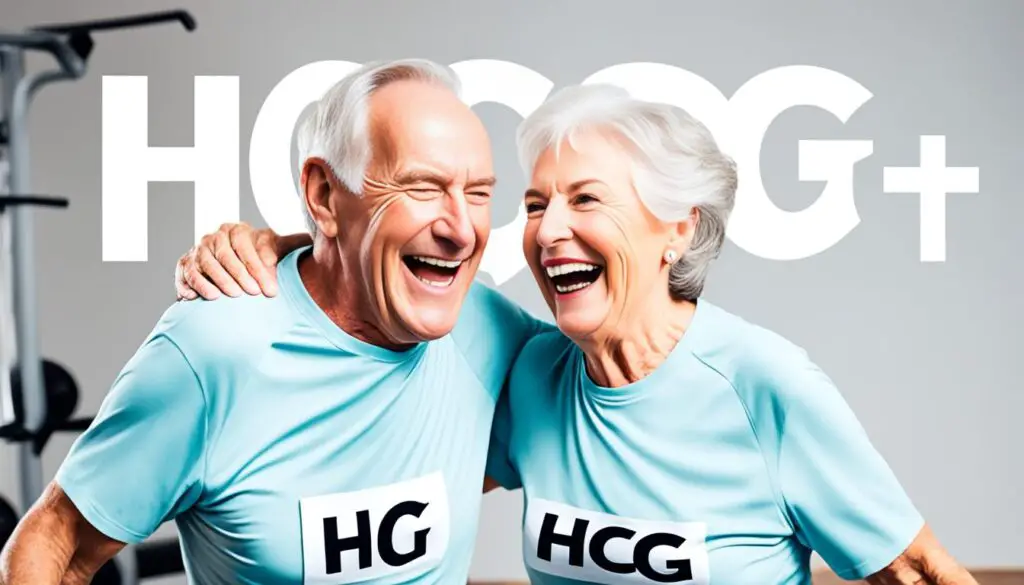
As seniors, it’s important to prioritize our health and fitness to maintain a high quality of life. That’s why personalized senior fitness programs are an excellent option for achieving our specific needs and goals. These programs are tailor-made to accommodate any physical limitations or medical conditions we may have, ensuring that we can safely and effectively improve our overall fitness.
One key aspect of personalized senior fitness programs is a combination of exercises that target different areas of fitness. This includes cardiovascular exercises to improve heart health, strength training to build and maintain muscle mass, flexibility exercises to enhance range of motion, and balance training to reduce the risk of falls. By incorporating these various types of exercises, we can experience a well-rounded and comprehensive fitness routine that boosts our overall physical well-being.
Furthermore, personalized fitness programs consider our individual needs and limitations, taking into account any physical challenges we may face. Whether it’s arthritis, joint pain, or mobility issues, these programs can be modified and adapted to ensure that we can participate comfortably and safely. Trained fitness professionals work closely with us to design a program that suits our unique circumstances, making sure that our exercise regimen is effective and enjoyable.
Benefits of Personalized Senior Fitness Programs:
- Improved cardiovascular health and stamina
- Increased muscular strength and endurance
- Enhanced flexibility and range of motion
- Improved balance and stability
- Reduced risk of injuries and falls
- Enhanced overall quality of life and well-being
Whether we’re looking to regain strength and mobility, manage chronic conditions, or simply stay active and healthy, personalized senior fitness programs offer us the guidance and support we need to reach our fitness goals. With a customized plan that considers our unique abilities and challenges, we can embark on a fitness journey that positively impacts our physical and mental well-being.
| Exercise Type | Description |
|---|---|
| Cardiovascular | Aerobic exercises such as walking, swimming, or cycling that elevate heart rate and improve cardiovascular health. |
| Strength Training | Exercises that target major muscle groups to increase strength, maintain muscle mass, and support overall mobility. |
| Flexibility | Stretching exercises that improve flexibility, enhance range of motion, and prevent muscle imbalances and tightness. |
| Balance Training | Exercises that focus on improving balance and stability to reduce the risk of falls and injuries. |
Embracing personalized senior fitness programs allows us to take control of our health and well-being. By working with dedicated fitness professionals and engaging in a customized exercise plan, we can make significant improvements in our physical fitness, reduce the risk of age-related ailments, and enjoy an active and fulfilling lifestyle well into our senior years.
The Role of Exercise in Senior Health and Well-being
Regular exercise is essential for maintaining senior health and well-being. It plays a vital role in improving physical strength, mobility, and independence, as well as reducing the risk of falls and injuries. Additionally, exercise has been shown to enhance cognitive function and mental well-being, contributing to an overall improved quality of life for seniors.
When it comes to exercise, seniors should strive to incorporate a variety of activities into their routine. This includes exercises that focus on cardiovascular fitness, such as brisk walking, swimming, or cycling, to improve heart health and stamina. Strength training exercises, like lifting weights or using resistance bands, can help maintain muscle strength and bone density, which is especially important for seniors as they age. Flexibility exercises, such as yoga or stretching, can enhance joint mobility and prevent stiffness. Finally, balance exercises, like tai chi or specific balance drills, can reduce the risk of falls and improve stability.
It’s important for seniors to consult with their healthcare provider before starting any exercise program, especially if they have underlying health conditions or physical limitations. They can provide guidance on exercise intensity, duration, and specific exercises that are suitable for individual needs. Additionally, seniors should listen to their bodies and make adjustments as necessary, taking breaks when needed and not pushing beyond their limits.
“Exercise is not optional for seniors; it’s a necessity. By staying physically active, seniors can enjoy improved physical health, mental well-being, and a higher quality of life.”
By prioritizing exercise and incorporating a well-rounded fitness routine, seniors can maintain their health, prevent age-related decline, and continue to engage in activities they enjoy. Regular exercise is a powerful tool for seniors to age gracefully and stay active and independent for as long as possible.
Conclusion
The combination of the HCG Diet and Exercise for Seniors is a powerful tool for managing weight, improving health, and promoting overall well-being in older adults. A gentle and tailored exercise routine, combined with the HCG diet, can help seniors achieve their weight loss and fitness goals while prioritizing their safety and long-term health.
Seniors should engage in regular exercise, even at a reduced intensity, while following the HCG diet. Gentle activities like yoga, walking, and biking are recommended to maintain a rhythm of physical activity. Gradually increasing calorie intake after the HCG diet is crucial to avoid weight gain and ensure a sustainable approach to weight management.
Before embarking on any weight loss program, it is imperative for seniors to consult with their healthcare provider. This will ensure that the HCG diet and exercise plan is suitable for their individual needs and medical conditions. Personalized senior fitness programs can also provide tailored guidance and support to help seniors optimize their health and fitness journey.
By incorporating the HCG Diet and Exercise for Seniors into their lifestyle, older adults can enjoy the benefits of weight loss, improved health, and enhanced overall well-being. With the right approach and mindset, seniors can achieve their health and weight management goals and lead a fulfilling and active lifestyle for years to come.
FAQ
Can seniors benefit from incorporating the HCG diet and exercise into their lifestyle?
Yes, seniors can benefit from incorporating the HCG diet and exercise into their lifestyle. It is important for seniors to maintain a rhythm of gentle exercise while on the HCG diet, cutting back on the intensity. Gradually increasing calorie intake after the HCG diet is essential to avoid weight gain.
What kind of exercise routine is recommended for seniors on the HCG diet?
Seniors should develop an exercise routine that includes both cardiovascular exercise and resistance training for optimal weight management and overall health. Gentle activities such as yoga, walking, or a gentle bike ride are recommended.
How should seniors adjust their exercise intensity while on the HCG diet?
Seniors should continue to engage in regular exercise while on the HCG diet, but at a reduced intensity. Daily or almost daily gentle exercise, such as walking or light jogging, is recommended. It is not advisable for seniors who have not exercised in years to start a moderate exercise regimen during the HCG diet.
What are some gentle exercise activities that seniors can try while on the HCG diet?
Seniors who are toning down their exercise on the HCG diet can try gentle activities such as yoga, walking, or a gentle bike ride. Taking the stairs instead of the elevator and trying online or on-demand workouts are also great options.
How should seniors gradually increase their calorie intake after completing the HCG diet?
After completing the HCG diet, seniors should gradually increase their calorie intake to avoid weight gain. It is recommended to start by increasing calorie intake by 200 kcal per day and continue until reaching the general optimum amount of 1500 kcal per day.
What should seniors do to maintain their weight after the HCG diet?
Seniors should reintroduce their normal diet routine, starting with low-carb and low-fat foods, and monitor their weight closely. Regular exercise is crucial for maintaining weight after the HCG diet, with at least 75 minutes of vigorous exercise or 150 minutes of moderate exercise per week.
Is the HCG diet safe for seniors?
The safety of the HCG diet is still a topic of debate. The FDA has advised against using over-the-counter HCG weight-loss products, as they have not been approved and may pose risks. Seniors should consult with their healthcare provider before starting any weight-loss program.
How effective is the HCG diet for seniors?
The effectiveness of the HCG diet for long-term weight loss is still under debate. While some people may experience short-term weight loss during the HCG diet due to severe calorie restriction, the long-term sustainability and maintenance of weight loss are uncertain.
Are there personalized fitness programs available for seniors?
Yes, seniors can benefit from personalized fitness programs that are tailored to their specific needs and goals. These programs can be designed to accommodate any physical limitations or medical conditions that seniors may have.
How does exercise benefit senior health and well-being?
Regular exercise is essential for maintaining senior health and well-being. It can help improve physical strength, mobility, and independence, reduce the risk of falls and injuries, enhance cognitive function and mental well-being, and improve overall quality of life.

